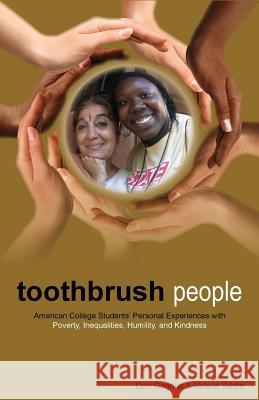Toothbrush People: American College Students' Personal Experiences with Poverty, Inequalities, Humility, and Kindness » książka
Toothbrush People: American College Students' Personal Experiences with Poverty, Inequalities, Humility, and Kindness
ISBN-13: 9781496121103 / Angielski / Miękka / 2014 / 112 str.
Toothbrush People: American College Students' Personal Experiences with Poverty, Inequalities, Humility, and Kindness
ISBN-13: 9781496121103 / Angielski / Miękka / 2014 / 112 str.
(netto: 82,39 VAT: 5%)
Najniższa cena z 30 dni: 85,33
ok. 16-18 dni roboczych.
Darmowa dostawa!
Why "Toothbrush People: American College Students' Personal Experiences with Poverty, Inequalities, Humility, and Kindness" is an Important Book for Students, Parents, and College Administrators As the entire title suggests, this book provides insight into American college students' experiences and reactions to poverty, inequality, humility, and kindness. Almost all of the stories (with the exception of one) are real life encounters students have had with strangers in other countries and cultures. In most cases, how they have internalized the interaction and why it is important to them is described in the narrative. How they have remembered the person and the interaction over time, is a compelling component of the second portion of the book, the 1990 and 2004 letters and stories. While reading these stories, appreciate the relevance of an international educational experience as part of a college degree program. This book depicts only one memory from their adventures abroad. Undoubtedly there have been a multitude of such encounters throughout the semester. These experiences prepare a person to be able to both better understand and fit into a globalized world. We will benefit as a country if our future leaders meet and interact with people from many countries and many cultures. Unfortunately these students are far from typical. From a 2010 report prepared by the Institute of International Education, they state: "Just over one percent of all U.S. students enrolled in U.S. higher education at any academic level typically study abroad during any single academic year. Among students pursuing Bachelor's degrees, about 14 percent study abroad at some point during their undergraduate programs." This book will encourage students, parents, faculty, and administrators to support and promote education abroad programs. Perhaps a new set of expectations for our college graduates (at least those who intend to lead their chosen fields) is in order. For example, not only critical thinking, team building, communication skills, and solid ethics are needed, but a global perspective may be the deciding factor for hiring a recent graduate. To gain such a perspective, students may want to consider adapting "new global strategies." For starters, here are a few recommendations: Never let your age get larger than the number of countries you have explored. Volunteer to work in a culture different from your own. Learn to think through what life would be like in their shoes. Learn both good and bad lessons from the cultures that you have explored. Learn how to implement these good lessons into your personal and/or work life. If you are a parent or grandparent, help your kids with these recommendations. Take them on a trip; pay for a trip; volunteer with them. Start getting them to "think globally." It is a very good investment in their future happiness. For more information concerning the book and the importance of international education, contact: Donald Gogniat dag1@psu.edu 717-891-7472
Zawartość książki może nie spełniać oczekiwań – reklamacje nie obejmują treści, która mogła nie być redakcyjnie ani merytorycznie opracowana.











